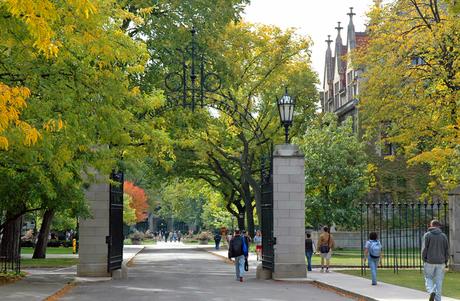
UChicago got trigger warnings and safe spaces wrong.
This past week, the University of Chicago sent a letter to incoming freshmen that stated they would not support “trigger warnings” or “safe spaces” at the school. Instead of making the topic a discussion, a conversation, a process, they made it a rule book. Universities should, of course, be spaces of enthusiastic debate and a mosaic of different views. But this debate begs the question: Where does the line between freedom of speech and infringing on somebody else’s right to that freedom lie?
This letter not only insults the intelligence of these students, but also blatantly misunderstands the entire concepts it seeks to destroy. UChicago students — like college students around the country — are intellectually curious and dynamic. We know that injustice, that terrible things, happen in the world. We also know that not everybody shares the same opinion as we do, and that’s okay. We understand that going to college is about meeting people who are vastly different from us and want to engage in those challenging, intellectual conversation.
But by making these bold claims, UChicago fails to see that safe spaces and open, intellectual dialog go hand in hand. College should be a place where students can step outside of their comfort zones and yes, even feel uncomfortable sometimes. UChicago’s letter and mandate apparently attempt to promote this environment, and interpret safe spaces and trigger warnings as attacks on this goal. But, ironically, that same goal is exactly what students who advocate for safe spaces and trigger warning want, too. In order to even create an environment in which all students can engage in these sometimes uncomfortable, challenging dialogues, however, it’s important to acknowledge systemic factors of discrimination that prioritize some voices over others. Safe spaces and trigger warnings exist so underrepresented groups can have a place where their voices are heard. When we create spaces in which marginalized groups feel better able to speak, the resulting discussion is all the more valuable and dynamic. But when minorities feel sharing their opinions is unsafe, and there is one voice type in the room, we essentially silence their voices.
A friend of mine is a student at the University of Chicago happens to also be a transwoman of color. The perspectives of trans POCs are rarely, if ever, shared in her classes. An environment like this is the very kind in which creating safe spaces would be valuable. These spaces act as communities and sounding boards for these students who are so often grouped as “other.” Having a designated place for underrepresented people sends the message that larger communities must understand that they are ultimately made up of smaller subsets. It sends the message that not everybody’s voice needs to be heard in every discussion — especially voices that are readily, often heard elsewhere
I personally have benefited from safe spaces on my own campus. As of this past year, I am a trauma survivor. What happened to me was horrific, but I have found so much solace in knowing other people in my community have been in similar situations and want to listen to me and share their stories. When I say that I don’t always want to hear the opinions of those who have not experienced what I have, it does not mean that their opinion does not matter generally. I am not quelling the voices of other students, but rather saying that sometimes, in the context of some experiences and discussions, I need the reassurance of a community who gets it. Similarly, when I ask for trigger warnings, I am not asking to be coddled. I am not avoiding the truth of how the real world is. I am simply asking to be warned.
Eradicating safe spaces, therefore, is not revolutionary nor does it fight political correctness. It is just insensitive and adversarial. Calling for discussions in higher learning to be completely unregulated so that they can be honest is short-sighted. In the supposed pursuit of free speech for their community, these administrators are silencing the voices of those who need to be heard the most.

